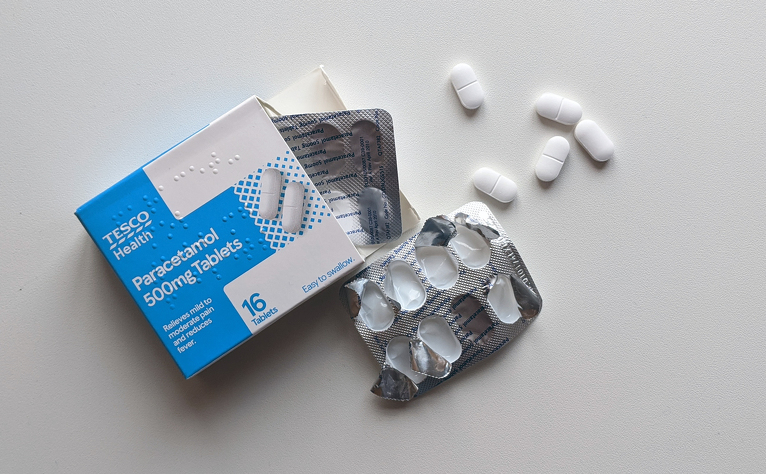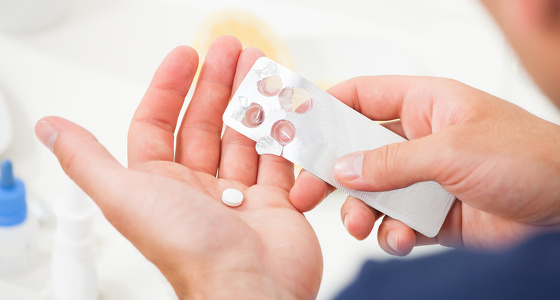A high temperature or fever could be an indication there is inflammation somewhere in your body. IBD causes inflammation in your digestive system and fever can be an early sign of IBD, or that you are having a flare of a diagnosed IBD. Find out more about medications to treat a fever...

A fever, or high temperature is when your body temperature increases above what is considered normal. Normal body temperature is around 37°C, although everyone’s normal will be slightly different, and will vary throughout the day. You have a fever if your temperature is 38°C or above.
As well as a raised temperature, other signs you have a fever may include:
When you have an infection your brain responds by increasing your body’s temperature. This is called the febrile response. It is a normal part of your immune response and makes it more difficult for bacteria and viruses to survive and multiply, helping your body to fight the infection.
Inflammation can also cause your temperature to increase.
Fever can also be a side effect of some medicines.
In some cases a raised temperature can be beneficial and will often go away within three days, and is therefore better left untreated. However, if you become uncomfortable you can take measures to reduce your fever, including:
If your temperature is very high (39.4°C and above), lasts for a long time or is accompanied by any other symptoms, such as severe pain, difficulty breathing, convulsions or sensitivity to light, you should seek urgent medical advice. The fever could be a sign of a serious infection, or a health condition that requires treatment.
Fever is a common symptom of inflammatory bowel diseases (IBD), such as Crohn's disease and ulcerative colitis.
A high temperature is an indication there is inflammation somewhere in your body. IBD causes inflammation in your digestive system and fever can be an early sign of the onset of IBD, or a sign that you might be having a flare if you already have an IBD diagnosis.
Some people who have IBD will not have a fever - this doesn’t mean that they do not have IBD or are not flaring.
Fever can also be a side effect of some medicines used to treat IBD, including:
Some medicines used to treat IBD will affect your immune system, meaning you can be more susceptible to minor and serious infections that aren’t related to your IBD. These infections can result in fever.
Fever can also be a sign of complications in IBD, such as abscesses or toxic megacolon.
Some people with IBD report having fevers during the night, disrupting sleep and causing night sweats.
If you have a fever which doesn't have an obvious cause, such as a cold, you should speak to your IBD team for advice.
Fever is a symptom that can indicate a change in disease activity, or complications which may require investigation or a change in your IBD treatment. Fever reducing medicines only mask the symptom of fever, rather than treating the cause and should never be a replacement for appropriate IBD treatment. Taking over-the-counter fever reducing medicines without seeking medical advice could be dangerous when you have IBD such as Crohn’s disease or ulcerative colitis.
If your fever is caused by a medicine you are taking, speak to your IBD team - they may be able to help you manage this side effect, or suggest an alternative treatment if it is causing you problems.
If you develop an infection not directly related to your IBD, speak to your IBD team as you may require additional treatment, especially if you are taking medicines which affect your immune system, including steroids, azathioprine and biologics.
Medicines used to reduce fever are called antipyretics. They act on your brain, causing it to override the febrile response, lowering the temperature of your body.
Antipyretic medicines do not usually require a prescription, although a doctor might prescribe another medicine to treat the underlying cause of a fever. There are two main types of antipyretic medicine, which are available over-the-counter.
Paracetamol is widely available and does not require a prescription. As well as reducing fever, it is effective in treating mild to moderate pain and can be used by adults and children. Paracetamol is available as:
Two paracetamol tablets every four hours, up to four times a day is considered a safe dose for adults. Side effects are uncommon with paracetamol, but you can check the patient information leaflet in your medicine packet for more information. Do not take more than the maximum dose as an overdose of paracetamol can be very dangerous.
Paracetamol is sometimes combined with other medicines, including other types of painkillers. Always check any additional medicines are also safe for you to use.
It is generally considered safe to take paracetamol if you have inflammatory bowel disease, however you should speak to your IBD team if your fever persists.
NSAIDs are a group of medicines that can reduce temperature, and also relieve pain and reduce inflammation.
Commonly used NSAIDS include:
NSAIDs can be used by adults and in some cases children, and are available in a variety of forms, including:
If you have inflammatory bowel disease, taking NSAIDS is usually not recommended. This is because some studies have suggested they can be harmful to your digestive tract, causing your IBD symptoms to get worse, or trigger a flare1. Always speak to your IBD team before taking any over-the-counter NSAID medicines.
If any other healthcare professional prescribes or recommends fever reducing medicines for you, you should tell them you have inflammatory bowel disease.

